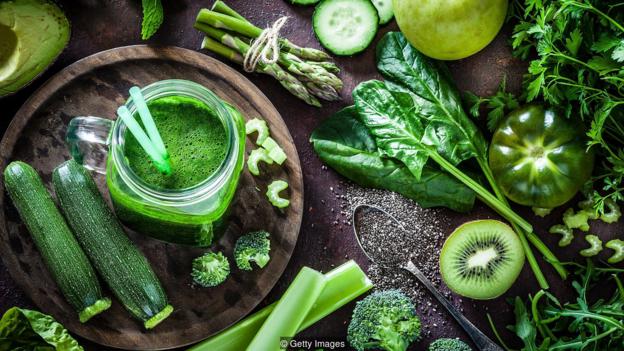If you’ve over-indulged of late, then the idea of detox may well appeal – flushing out the Christmas and New Year excesses, and negotiating the start of the year afresh. There are plenty of products that offer help, from detox massages and smoothies to herbal teas and starvation diets. You can find promises of glowing skin, weight loss and a healthier you that can help you shrug off the sluggishness of mid-winter. Rinsing your system of impurities sounds like a good way to start the year, but is there any evidence that it works?
The word detox is used in two very different ways. The first refers to the medical detoxification programmes that help people with a serious alcohol or drug problems to get clean.
The other is the kind of home detox marketed to us with promises to rid our bodies of “toxins”. Modern life does, of course, bring us into contact with plenty of synthetic chemicals and natural substances, some of which can be toxic, but how much evidence is there that a detox will eliminate them from our bodies?
It is true that the day you cut out alcohol and embark on a healthier diet, toxins will leave your body. But this happens every day, not just when drink raw vegetable juice. The body already has its own clever system to rid itself of toxins. If it didn’t, we’d be in trouble. All over the body, work is taking place to keep out or eliminate toxins – from our skin acting as a barrier to the fine hairs in our respiratory system trapping particles in mucus so we can sneeze them out.
Part of the gut contains special lymphatic cells called Peyer’s patches, which form bundles in the mucous membrane lining. Found in the lowest part of the small intestine, the shape of these patches allows them to identify and screen out harmful particles so that they are not absorbed into the bloodstream alongside the beneficial nutrients from our food. Although we might have a sense that our intestines are somehow dirty and in need of cleansing, they’re just doing their job.

Filling your diet with fresh fruit and vegetables could be a psychological trick to signal a fresh start (Credit: Getty Images)
Meanwhile your kidneys filter half a cup of blood a minute, excreting toxins such as urea out of the body as urine.
When it comes to alcohol, it’s the liver that has the job of detoxing you. It’s a two-step process. First alcohol is converted by enzymes into acetaldehyde, which is toxic, but this is quickly converted into acetic acid, then carbon dioxide and water. If you drink faster than your liver can metabolise the alcohol, then it can’t keep up and your blood alcohol level will rise.
If you persistently drink to excess, acetaldehyde can damage the liver. But the liver can successfully detoxify the body from more moderate amounts of alcohol. It’s another of the mobile detox systems we carry round with us all the time.
So do special detox diets work? They range from those where you simply cut out alcohol, caffeine and refined sugar to much stricter diets where you only drink liquids for several days, before gradually reintroducing small amounts of food. In 2012 Edzard Ernst, emeritus professor of complementary medicine at the University of Exeter, attempted a systematic review of the literature, but found it impossible to isolate enough studies on this kind of home detox because literature searches also threw up the many studies on drug detox programmes.
In 2014 two Sydney-based researchers did succeed in publishing a review of studies on detox diets. They couldn’t find any randomised controlled trials of commercial detox diets, although they did find a small number of studies without control groups.

Swerving alcohol for one month a year is not as good as laying off drinking a few days a week regularly (Credit: Getty Images)
For example in research on a seven-day-detox diet, conducted with just 25 people in 2000, people felt healthier afterwards and there was a trend towards improved liver function, but the improvement was not statistically significant.
They also found small trials looking at the elimination of particular toxins from the body, but again most were small, didn’t include controls or had other flaws, leading the authors to conclude that good evidence in favour of detox diets is lacking.
That leaves us reliant on anecdote. People who go on crash diets or juice fasts usually do lose weight in the short-term, but it’s hard to find evidence that the weight stays off in the long-term.
So should you bother with a detox? When it comes to alcohol, it’s healthier to avoid it for several days every week of the year than for a few weeks in a single detox. Spending a period of time focussing on eating more fruit and vegetables is of course beneficial for your health too. A quick fix is not going to work as well as pledging to eat a Mediterranean diet and to exercise for the rest of your life.
But the idea of detox is something many find appealing. If it feels good to punish yourself to compensate for your over-indulgence, maybe it’s your sins rather than your toxins that you’re keen to wash away. But if you can hack it, it’s possible that psychologically, a detox could provide a new start – a break between your old habits and the new ones you’d like to acquire. However, you need to have a plan for what happens next or your old habits will return.
Perhaps we should think of a detox as more of a metaphor for shedding your old habits, rather than something that flushes impurities from your gut and your organs. Your body is constantly detoxing itself without special teas, juices or diets.
But you can help it to do its job by eating a healthily diet, drinking water, taking regular exercise and getting the sleep you need.
Read the original article on BBC.
More about:
















































